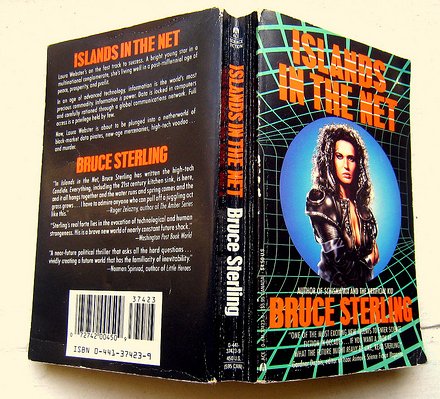from Islands in the Net, Bruce Sterling (1988):
Then one of the Inadin produced a flute. A second found an intricate xylophone of wood and gourds, bound with leather. He tapped it experimentally, tightening a cord, while a third reached inside his robe. He tugged a leather thong — at the end was a pocket synthesizer.
The man with the flute opened his veil; his black face was stained blue with sweat-soaked indigo dye. He blew a quick trill on the flute, and they were off.
The rhythm built up, high resonant tones from the buzzing xylophone, the off-scale dipping warble of the flute, the eerie, strangely primeval bass of the synthesizer . . . “He sings about his synthesizer,” Gresham murmured.
“What does he say?”
I humbly adore the acts of the Most High,
Who has given to the synthesizer what is better than a soul,
So that, when it plays, the men are silent,
And their hands cover their veils to hide their emotions.
The troubles of life were pushing me into the tomb,
But thanks to the synthesizer,
God has given me back my life.
+ + +

great passage!
much better than this one, which is, nonetheless, interesting for those of us curious about all the ‘trading in futures’ btwn sci-fi and reggae/rasta —
One of my big cyberpunk pet-peeves is how virtually (hah virtually!) every novel has some quasi-mystical generally non-caucasian “not-quite-plugged-in” culture there to serve as contrast to the cold corporate mechanized world or whatever. I blame Neuromancer’s space-rastas for popularizing the trend (although there might be an even earlier reference point I am forgetting/missing) and I’m always happy when I read a post-1980 sci-fi book that manages to avoid it.
Blaming Gibson seems appropriate. But I’d argue that this Sterling book sidesteps that criticism. It’s not quite humor, but the anarcho-Tuareg scenes are played to upend the ‘not-quite-plugged-in’ thing – blond white American protagonist is surprised to see how online they are, how media-savvy (video makeup and costumes for the camera), and of course there’s the T.E. Lawrence references.
And Rizome (the western transnational corporation) is arguably one of the most cultish & mystical groups in the sprawl of cultish groups here.
True, the brown people get the best music in this book, but in some other Sterling novel there’s a very very funny running thread about how Dutch music has conquered the global pop market (alongside Holland as a nation of fierce extremists, since they’re slowing drowning w/ global warming).
I love this book!
And for better or worse I was actually introduced to the idea of Dub through Neuromancer and found King Tubby as a result. Although I do agree about Gibson’s use of the Space Rastas as the kind of noble savages of the digital world, kept more pure in the distance. Sterling is pretty much always much funnier and more complicated, as Jace indicates. On a totally unrelated note seek out Sterling’s recent novella/long short story ‘Kiosk’ it’s f-ing great. Boing boing on it here:
http://boingboing.net/2008/01/15/bruce-sterlings-kios.html
I think you actually have to go back further, and blame the godfather – Samuel R. Delaney.
In the 1960’s, in Nova, and Babel 17, he kind got this thing rolling.
Course, being a black guy from NYC, his idea of “not plugged in” culture was the greeks…